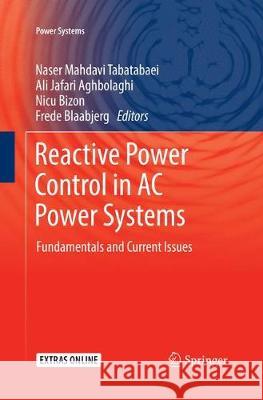Reactive Power Control in AC Power Systems: Fundamentals and Current Issues » książka



Reactive Power Control in AC Power Systems: Fundamentals and Current Issues
ISBN-13: 9783319845715 / Angielski / Miękka / 2018 / 634 str.
Reactive Power Control in AC Power Systems: Fundamentals and Current Issues
ISBN-13: 9783319845715 / Angielski / Miękka / 2018 / 634 str.
(netto: 325,85 VAT: 5%)
Najniższa cena z 30 dni: 327,68
ok. 16-18 dni roboczych.
Darmowa dostawa!
Preface.- Chapter1: Introduction.- Chapter2: Fundamentals of Reactive Power in AC Power Systems.- Chapter3: Reactive Power Role in AC Power Transmission Systems.- Chapter4: Reactive Power Compensation in Energy Transmission Systems With Sinusoidal and Nonsinusoidal Currents.- Chapter5: Reactive Power Importance in Wind Power Plants.- Chapte6: Reactive Power Control and Voltage Stability Problem.- Part 1: Fundamentals and Contemporary Issues of Reactive Power Control in AC Power Systems.- Chapter7: Reactive Power Control and Voltage Stability Problem.- Part 2: Chaper8: Reactive Power Compensation in AC Power Systems.- Chapter9: Modern Solution for Dynamic Reactive Power Compensation.- Chapter10: Optimal Placement of Reactive Power Compensators in AC Power Networks.- Chapter11: Reactive Power Optimization in AC Power Systems.- Chapter12: Implementing Reactive Power Optimization Using Digsilent and Matlab.- Chapter13: Multi-Objective Optimal Reactive Power Dispatch Considering Uncertainties in the Wind Integrated Power Systems.- Chapter14: Reactive Power Optimization Effects on Relays Coordination in AC Power Systems.- Chapter15: Communications for Electric Power Systems.- Chapter16: Scada Applications for the Electric Power System.- Chapter17: The Effect of Geomagnetic Storms on the Electricity Networks.- Chapter18: Electric Transmission Lines Environmental Impact Monitoring.
This textbook explores reactive power control and voltage stability and explains how they relate to different forms of power generation and transmission. Bringing together international experts in this field, it includes chapters on electric power analysis, design and operational strategies. The book explains fundamental concepts before moving on to report on the latest theoretical findings in reactive power control, including case studies and advice on practical implementation students can use to design their own research projects.
Featuring numerous worked-out examples, problems and solutions, as well as over 400 illustrations, Reactive Power Control in AC Power Systems offers an essential textbook for postgraduate students in electrical power engineering. It offers practical advice on implementing the methods discussed in the book using MATLAB and DIgSILENT, and the relevant program files are available on the book’s website.
1997-2026 DolnySlask.com Agencja Internetowa
KrainaKsiazek.PL - Księgarnia Internetowa









